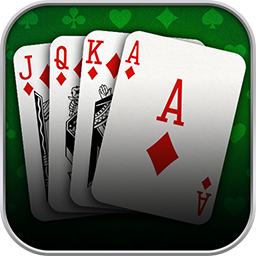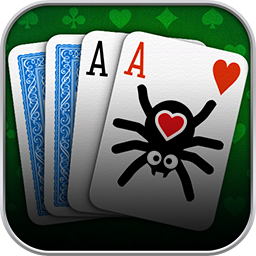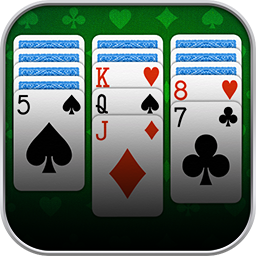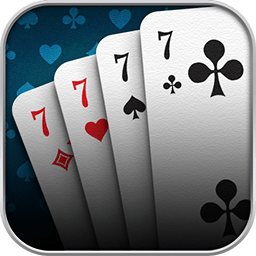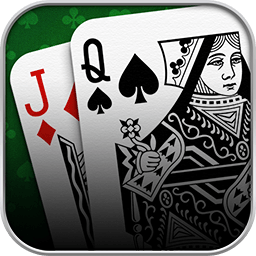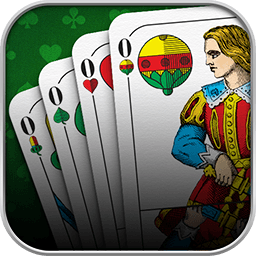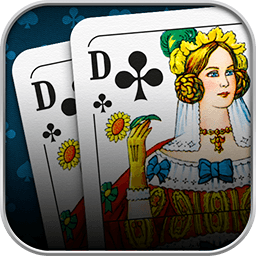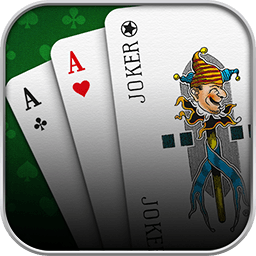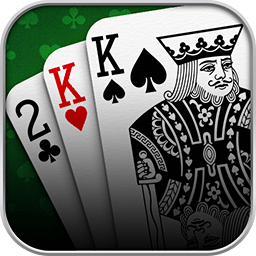We invite you to play Bid Whist online and free at the Whist Palace! Bid Whist is based on Classic Whist. Like that, it is a true trick-taking game for four players in two partnerships, where you try to win as many tricks as possible.
However, Bid Whist has additional components, such as a Whist bidding phase, different game types, Jokers, and a kitty, making the game more interesting and intricate.
The game goes on for your selected number of rounds or until one partnership reaches seven or seven negative points. You can win or lose these points at the end of each round, depending on the number of tricks you won.
On this page, we explain the Bid Whist rules in detail so that you can get all the info! Read and learn about the following topics:
The Whist Cards & Players
Traditionally, Bid Whist playing cards are 54 cards of the American Poker pattern pack:
All 13 ranks, from Two to Ace, each appear in the four familiar suits: Clubs, Spades, Hearts, and Diamonds. And two Jokers are added.
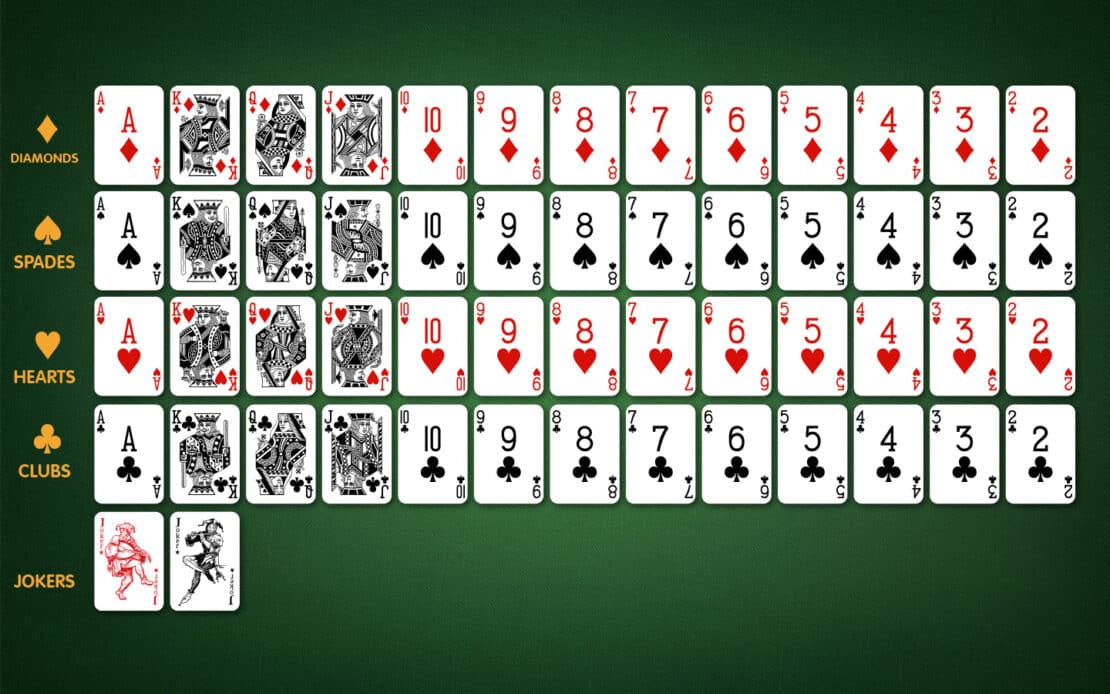
As you can see, our default is Bid Whist with Jokers. We explain their role below as it depends on the game type, just like the card order in Bid Whist. If you prefer playing Bid Whist without Jokers, you can do so with the respective custom rule!
As there are two partnerships, Bid Whist requires four players. The two players of one partnership always sit at opposite sides of the table. Once you are at the table, the partnerships remain unchanged until you complete the last round.
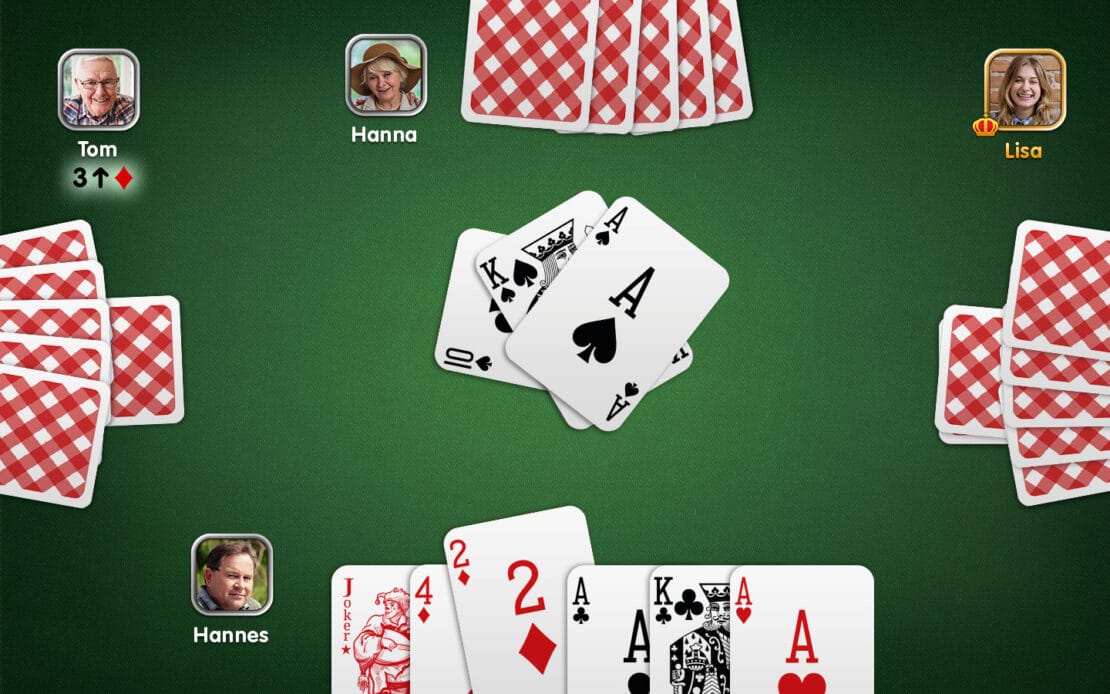
Bid Whist Rules
Now that everyone is at the table, let’s have a closer look at how to play Bid Whist online and offline. A round always begins with dealing the cards and ends with updating and checking each partnership’s score. In between, there are two game phases: First the bidding, then the actual trick-taking.
This flow continues until at least one partnership reaches seven or seven negative points. At that point, the table ends, and its winner is determined by the highest total score.
The Deal
At the beginning of the first round at a table, one player becomes the first dealer. You can use any method to determine who deals the cards.
When playing free Bid Whist online at the Whist Palace, we determine the first dealer of the table for you, and dealing is taken care of automatically, as well.
Each player receives twelve cards in clockwise order. Six cards are put aside and become the kitty, which you get to pick up if you win the bidding. After the dealer has dealt the cards, the player to the dealer’s left always starts the bidding process and the trick-taking – they are called the forehand. Each round, the dealer position moves clockwise to the next player.
Whist Bidding
The bidding part of the game does not exist in Classic Whist but is characteristic of Bid Whist. So, what is Whist bidding for? If you win the bidding, you gain advantages and, to keep it fair, an obligation.
Advantages: You become the declarer, determining the round’s contract. That means you get to select the trump suit and the order of card ranks during trick-taking. And then, you can even improve your hand with the cards in the kitty.
Obligation: If you win the bidding, your partnership must reach at least the number of points you bid. You will understand what that means in a second, but you can also skip ahead.
The Whist Bidding Process
Bidding takes place each round after dealing in a single run of clockwise bidding, starting with the forehand. When it is your turn to bid, you must either bid higher than the current highest bid or pass. After making a bid, you cannot change it!
Once all four players bid or pass, the player with the highest bid becomes the declarer: They first announce the final part of their contract. We explain what that means further below. Then, they pick up the kitty before discarding the same number of cards. These discarded cards count as their partnership’s first trick, by the way.
Now, the trick-taking begins!
If the declarer’s partnership doesn’t fulfill the contract, they lose and face a penalty for what is called overbidding!
Whist Bidding: Ranking of Bids
This list starts with the lowest possible rank and ends with the highest possible one.
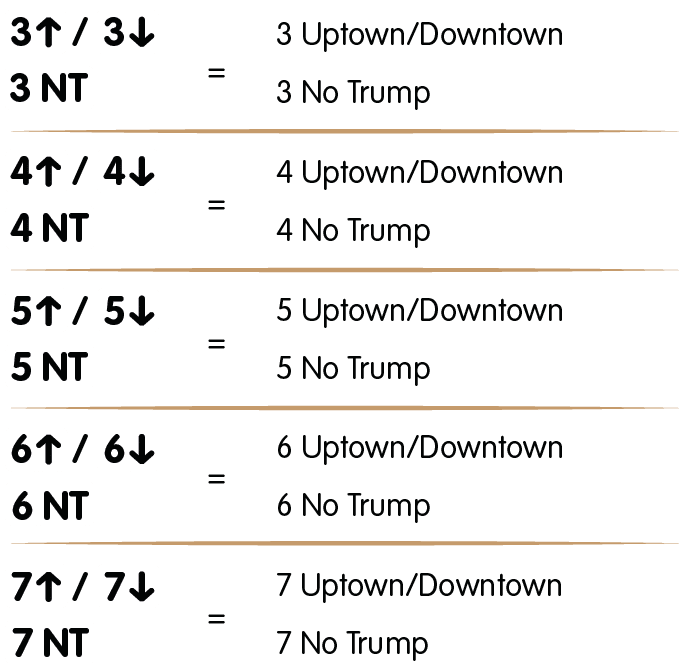
Meaning of a Bid
A bid in Bidwhist consists of two parts: A number and a suffix.
Number: It represents the number of points above six you intend to win this round.
That means with a bid of 3, you plan to win at least three points, which means taking nine or more of the 13 tricks in the round.
Suffix: It reveals some information about the type of game you intend to play that round. You can choose between Uptown, Downtown, or No Trump.
You can see that Uptown and Downtown bids of the same number have the same rank. So, if another player already made an Uptown bid, you cannot make a Downtown bid of the same number.
Instead, you could either make a No Trump bid of the same number or any bid with a higher number. If neither option fits, you can pass.
Whist Bids, Game Types, and Contracts
The suffix you are choosing in your bid is already one half of the game type, which you will announce in your contract before trick-taking if you become the declarer.
The game type contains two pieces of information: The first part clarifies if there is a trump suit and, if yes, which suit is trump. The second part carries information about the order of card ranks, in other words: If you are playing Uptown or Downtown. This means that there are ten possible game types.
And the number from your bid combined with the complete game type make up the contract of the round, which means the contract holds three important cornerstones of your round:
- the minimum number of points you must win this round
- information about the trump suit
- If you won bidding with an Uptown or Downtown bid, you need to announce the trump suit.
- If you won the bidding with a No Trump bid, that itself is the information: There is no trump suit.
- information on the card order (Uptown or Downtown)
Now that you know how these aspects interlock, let’s look into the game type components and how they affect the card order during trick-taking next.
Game Types and Card Order in Bid Whist
The game type is part of a round’s contract. And during Whist bidding, the suffix of your bid gives some information on the game type you want to play.
When playing Bid Whist online at the Palace, you can choose between the three classic Bid Whist game type components for bidding: Uptown, Downtown, and No Trump. They impact the trump suit or its absence as well as the order of card ranks during trick-taking. Let’s take a closer look.
Uptown
This suffix comes with a trump suit. If you become the declarer, you will round out your contract by announcing the trump suit just before picking up the kitty.
The ranks follow the typical order here: Ace and King are the strongest, while Three and Two are the weakest ranks of a suit.
Descending card order of Uptown trump cards:

Descending card order in Uptown non-trump suits:

Downtown
This suffix comes with a trump suit. If you become the declarer, you will round out your contract by announcing the trump suit just before picking up the kitty.
The ranks follow an inverted order here: Now Aces and Twos are the strongest ranks of a suit, while Queens and Kings are the weakest.
Descending card order of Downtown trump cards:

Descending card order in Downtown non-trump suits:

No Trump
This suffix obviously comes without a trump suit. If you become the declarer, you will round out your contract by announcing the order of card ranks (Uptown or Downtown) just before picking up the kitty.
No Trump rounds double all player’s scores.
Descending card order in all suits when playing No Trump Uptown:

Descending card order in all suits when playing No Trump Downtown:

Trick-Taking
The game type of the round has been declared, and the kitty was picked up and discarded. That means it is time to play some cards now! This part of the game mostly follows the classic Whist rules:
- The forehand plays one card of their choice.
- Now the next player in clockwise order must play a card of the same suit if they can.
If the forehand played a trump card, the other players must follow that lead as well. - If they cannot follow suit, they can play any card they want.
- After each player adds one card, the strongest card wins the trick.
- The player who added this card collects the trick, puts it face-down on the table, and then opens the next trick by playing a card.
That continues until no player has any cards left in their hand.
Partnerships collect the tricks they win in one pile. And remember, the cards the declarer discarded after picking up the kitty count as their partnership’s first trick.
But which card is the strongest in a trick? If no trump card was played, then the strongest card of the leading suit wins the trick. But trump cards are stronger than any non-trump card, regardless of rank. If several players use a trump card, the strongest trump card wins. You can never win a trick with a card that is neither of the leading suit nor a trump card.
The order of card ranks within the same suit and if there even are any trump cards depends on the game type. See the card order section above for detailed information.
A Note About the Jokers:
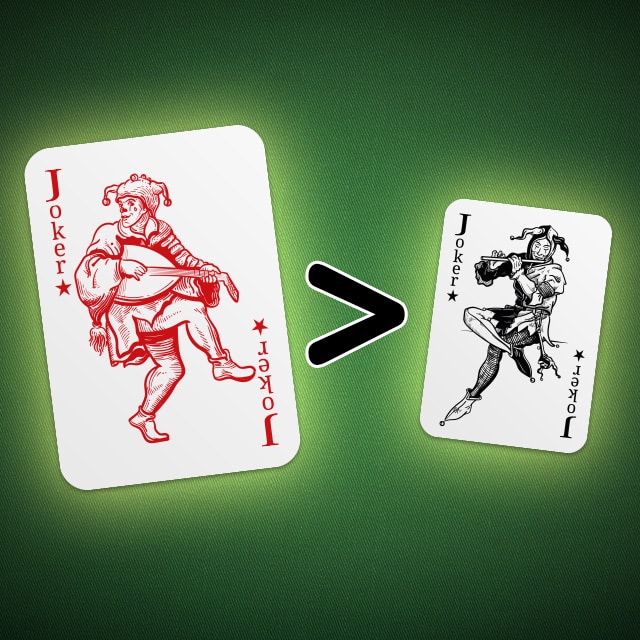
In rounds with trump, i.e., Uptown or Downtown, both Jokers belong to the trump suit. They are the strongest cards in the game, and the red one is stronger than the other.
But if No Trump has been declared, the Jokers are the weakest: They don’t belong to any suit, and they can never win a trick. If you open a trick with a Joker, the next player can play any card. The first non-Joker card determines the suit that the following players need to serve.
Scoring
Counting Points in Bid Whist is easy, so, here we go: You can win or lose points at the end of each round. Win or loss depends on the number of tricks your partnership collected as well as the declarer’s contract.
Basically, each trick over six tricks is worth one point. But if you get these points is a different question.
If you are the declarer, your partnership must reach at least the number of points you bid. The cards you discarded after picking up the kitty count as your first trick.
- If your partnership fulfills that condition, you get one point for each trick above the sixth.
Example: You play a game of 4 Uptown, and your partnership takes eleven tricks. Congrats, your partnership wins five points!
- If your partnership misses that condition, you overbid and lose points according to your bid.
Example: You play a game of 4 Uptown, and your partnership only wins nine tricks. Oh no, your partnership loses four points because you bid four but only reached three points!
If your partnership plays against the declarer, you automatically win one point per trick above the sixth trick.
Additionally, if No Trump is declared, all points in a round are doubled after all other calculations are done and the winner is determined.
The points for each round are tallied per partnership. The table ends after your selected number of rounds is completed or after one partnership reaches seven or seven negative points. Finally, the team with the most points wins.
And, of course, if you play free Bid Whist online at the Whist Palace, all scoring is taken care of automatically.
A Note on Overbidding
We want a pleasant gaming experience for everyone playing free Bid Whist online! That is why we encourage you only to announce contracts you think you can win. With this in mind, there is a Chips penalty for overbidding at the Whist Palace to discourage high bids for the sake of becoming the declarer and thwarting other players’ bids: If you fail to fulfill your contract, you not only lose points. As declarer, you must also pay a Chips fee to the bank as a penalty. The exact amount is listed in the table requirements and depends on the entry fee for the table.
Custom Rules
Once you are familiar with the classic Bid Whist rules, you could modify the rule set for new challenges or tailor the game to the Whist rules you are used to. Go ahead, select a table with custom rules and play Bid Whist online in a new way.
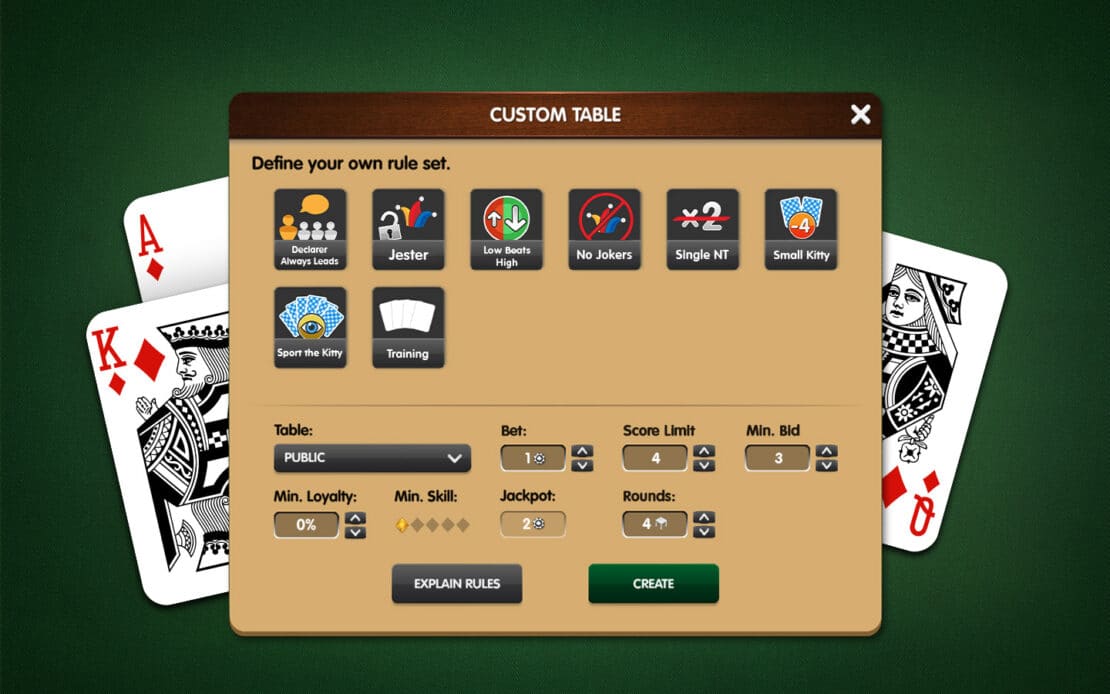
| Custom Rule | Description | |
|---|---|---|
 | Declarer always leads | Instead of the forehand, the declarer always leads the round’s first trick. |

| Jester | In a game of No Trump, you can always play Jokers in your turn, even if you have a card of the leading suit. All other rules regarding Jokers in a round of No Trump remain unchanged. |

| Low Beats High | During bidding, Downtown bids beat Uptown bids of the same number. |

| No Jokers | There are no Jokers. The kitty is reduced by two cards. If the custom rule Small Kitty is active too, there will be no kitty at all. |
 | Single NT | If a game of No Trump was declared, the points in this round are not doubled anymore. |
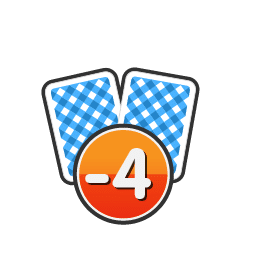
| Small Kitty | The kitty is reduced by four cards, which are dealt to the players instead. The cards discarded by the declarer after picking up the kitty do not count as a trick anymore. If the custom rule No Jokers is active too, there will be no kitty at all. |

| Sport the Kitty | The kitty is briefly revealed to all players before the declarer picks it up and continues with discarding as usual. |
 | Training | This table does not affect the league or your skill ranking. But you still gain experience points. |
If you are ready to play now, we invite you to join a table at the Whist Palace. Have fun, and we wish you a good hand!

